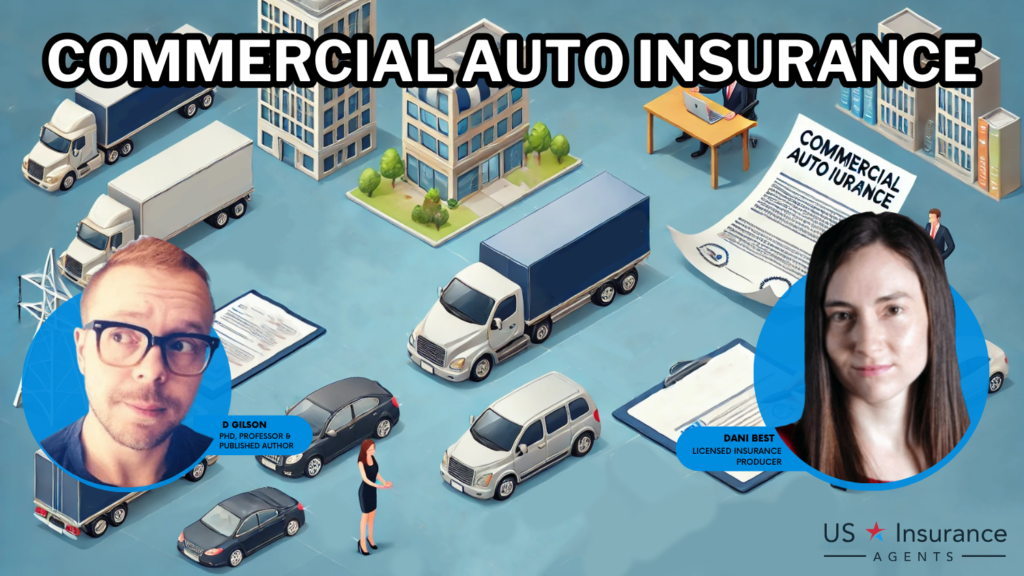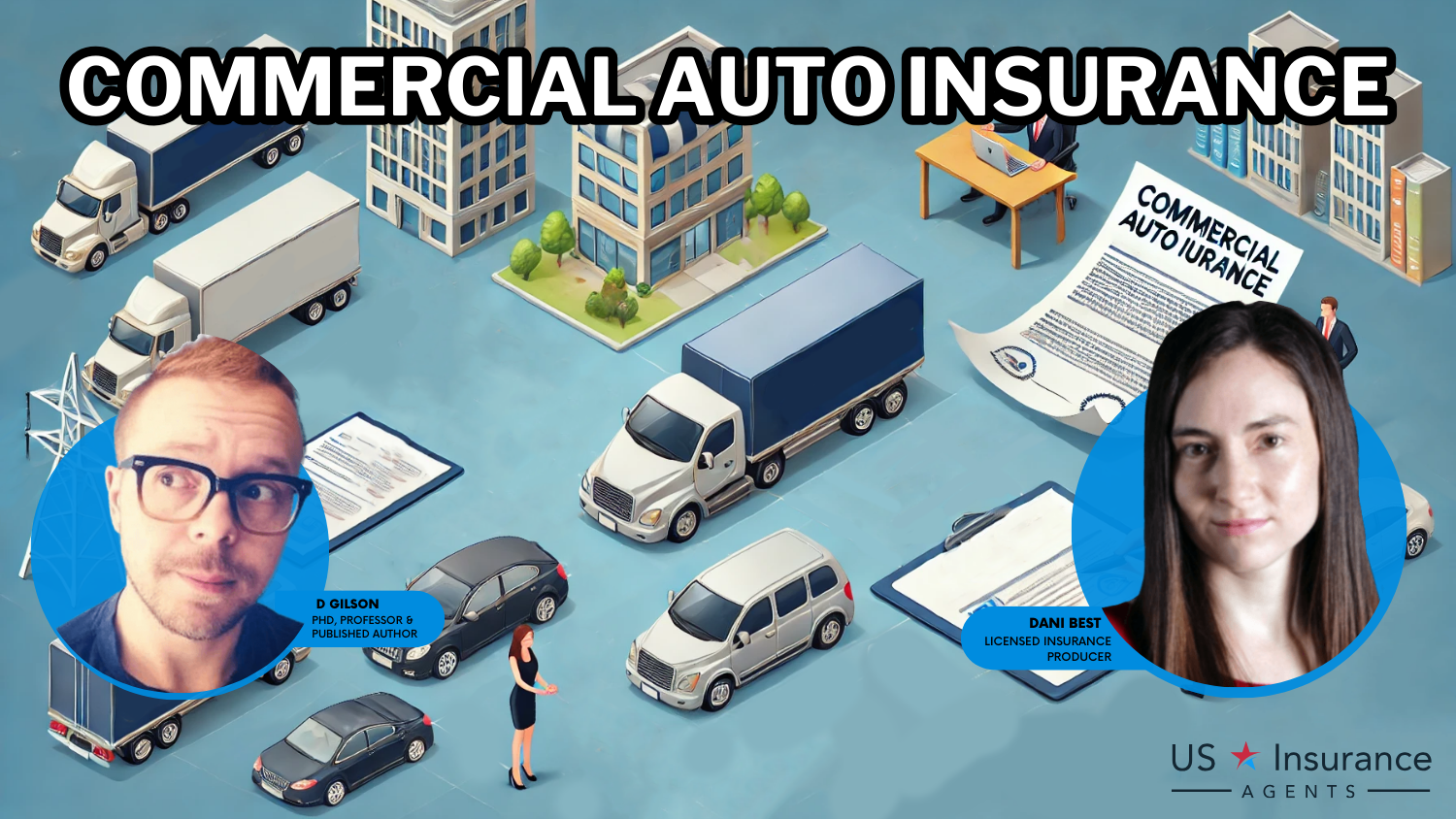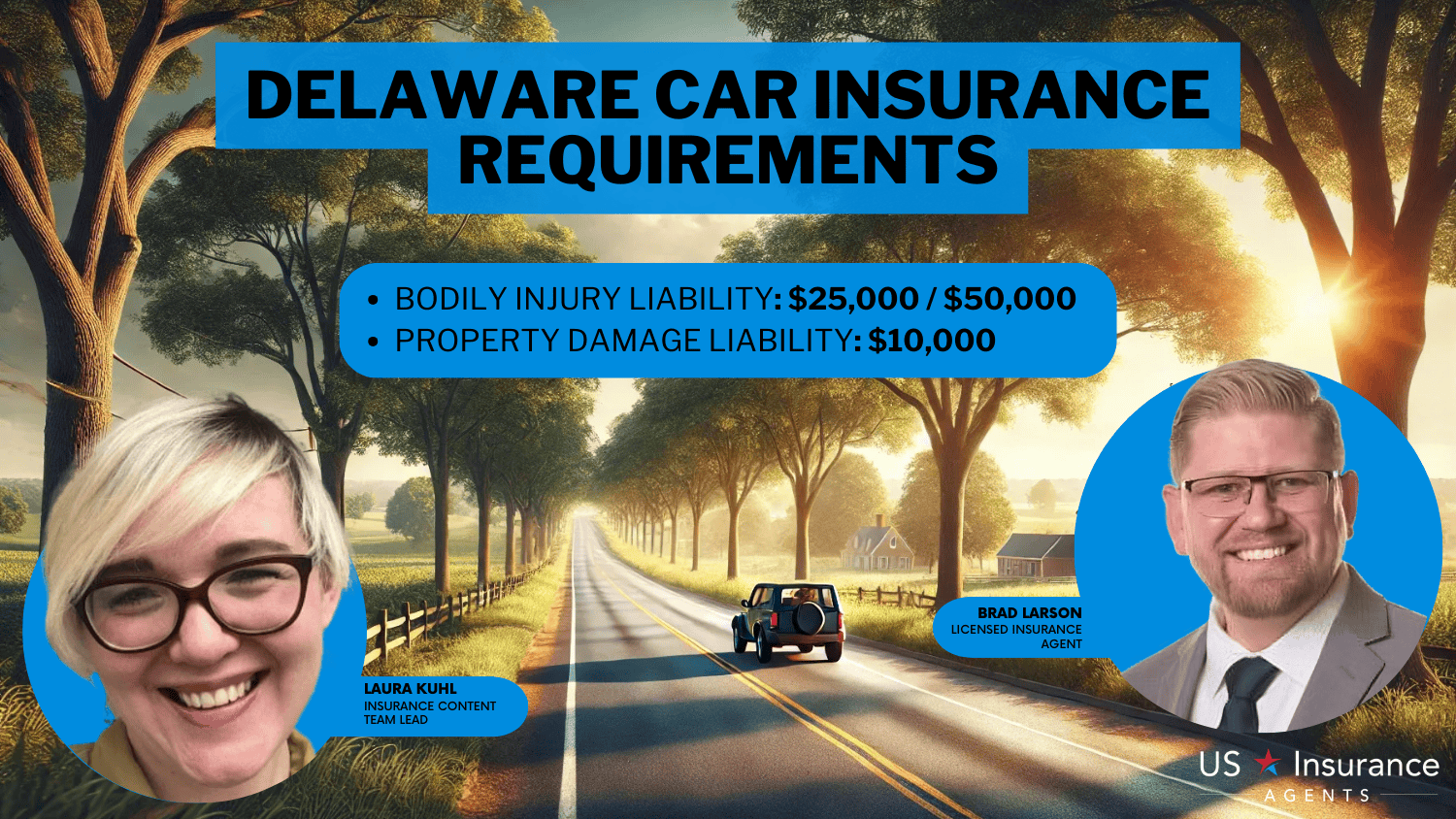Commercial Auto Insurance: A Complete Guide (2026)
Unlock the complexities of commercial auto insurance with our in-depth guide: a valuable resource for navigating coverage options, legal requirements, and optimizing your business's protection. Gain a comprehensive understanding of Commercial Auto Insurance: A Complete Guide and make informed decisions to safeguard your assets and operations.
Read more Secured with SHA-256 Encryption





Table of Contents
Table of Contents


Professor & Published Author
D. Gilson is a writer and author of essays, poetry, and scholarship that explore the relationship between popular culture, literature, sexuality, and memoir. His latest book is Jesus Freak, with Will Stockton, part of Bloomsbury’s 33 1/3 Series. His other books include I Will Say This Exactly One Time and Crush. His first chapbook, Catch & Release, won the 2012 Robin Becker Prize from S...
D. Gilson, PhD


Sr. Director of Content
Sara Routhier, Senior Director of Content, has professional experience as an educator, SEO specialist, and content marketer. She has over 10 years of experience in the insurance industry. As a researcher, data nerd, writer, and editor, she strives to curate educational, enlightening articles that provide you with the must-know facts and best-kept secrets within the overwhelming world of insurance....
Sara Routhier


Licensed Insurance Producer
Dani Best has been a licensed insurance producer for nearly 10 years. Dani began her insurance career in a sales role with State Farm in 2014. During her time in sales, she graduated with her Bachelors in Psychology from Capella University and is currently earning her Masters in Marriage and Family Therapy. Since 2014, Dani has held and maintains licenses in Life, Disability, Property, and Casualt...
Dani Best
Updated September 2024
Are you looking for commercial insurance that provides comprehensive coverage and competitive rates for your business? In this article, we will explore the key factors to consider when choosing commercial insurance, including the types of coverage available, factors affecting insurance rates, and tips for selecting the best insurance providers.

Whether you own a small business or manage a large corporation, finding the right insurance coverage is crucial to protect your assets and mitigate financial risks. Businesses that prioritize safety and responsible driving can often qualify for a commercial car insurance discount, rewarding their commitment to maintaining a fleet of well-insured vehicles.
Enter your ZIP code now to compare rates from the top insurance providers and secure the best deal for your commercial insurance needs.
The Coverages Included on a Commercial Auto Insurance Policy
Remember, this isn’t the same as business insurance. We’re talking about cars. Keep reading as we break down the most important elements of a commercial auto insurance policy.
Liability Coverage
The first coverage on a commercial auto insurance policy is liability. Liability comes into play when the operator of the vehicle causes an accident whether they hit another vehicle, pedestrian, or object. On a commercial auto insurance policy, the liability limit is a single limit which includes bodily injury and property damage suffered by the other party. Small businesses might have a lower liability limit like $300,000 while larger businesses will have $1 million or more.
Uninsured Motorist Coverage
Uninsured motorist covers the business owner’s vehicle and occupants if they are hit by an uninsured or underinsured motorist. An uninsured driver doesn’t have an insurance policy with liability coverage at all while an underinsured driver does have insurance but their limits of liability are too low to cover the damage they caused. This coverage is also used when the business owners vehicle has been hit by a hit and run driver. There are deductibles associated with uninsured motorist claims. If it is known who the uninsured motorist is and all of their information has been collected then it will typically be a $100 deductible which can be recovered if/when the insurance company is able to collect money from them for the cost of the accident. If the other driver isn’t known, such as a hit and run driver, then it is typically a $300 deductible. This can be different depending on the state; there are no-fault states where each driver’s policy cover their own losses only.
Comprehensive Coverage
Comprehensive covers damage to the insured vehicle which wasn’t caused by a collision. Typical comprehensive claims are theft, fire, vandalism, or an accident that was due to impact with an animal. There is a deductible for comprehensive claims, with a lower deductible costing more than a higher deductible. The deductible is the amount that is not covered by the insurance. As an example, if the car was stolen and the value of it was $10,000, with a $500 deductible the car owner would receive a payment of $9500.
Collision Coverage
Collision covers the damage to the insured vehicle that is caused by an at-fault accident they were involved in. As with comprehensive coverage, there is a deductible involved and smaller deductibles equal a higher premium being charged.
Medical Coverage
Medical coverage is for the driver and any occupants of the covered vehicle. This coverage applies to any sustained injuries regardless of who’s fault the accident was.
Towing & Roadside Assistance
Towing and roadside assistance provides coverage for vehicle breakdowns. How towing is covered depends on the insurance company. Some companies have a flat limit for towing coverage such as $50 or $100. Other companies will cover any reasonable tow. They judge reasonable as the vehicle being towed to a nearby place where the vehicle can be fixed. They won’t cover the entire cost of a tow if, say, the person wants to tow the vehicle 100 miles to their own mechanic. Roadside assistance pays for the labor if the driver needs help on the side of the road such as having a flat tire replaced or a dead battery. Roadside assistance only covers the labor involved, not the cost of a new tire or other parts.
Rental Reimbursement
Rental reimbursement is a coverage that covers the cost of a rental vehicle for the time an insured vehicle is being repaired. The vehicle must have been involved in an accident, been stolen, or some other type of covered loss. It doesn’t cover something like a person wanting to rent a car while out of town on vacation.
Optional Coverages
Another optional coverage, Gap insurance, covers the cost of what a car is worth versus how much is owed on a loan for it. New cars lose a lot of value once they’re driven off a lot so more money could be owed on the loan than what the car is worth. Gap insurance covers the amount of the loan regardless of the value of the vehicle at the time is stolen or totaled in an accident.
Free Auto Insurance Comparison
Compare Quotes From Top Companies and Save
Secured with SHA-256 Encryption
Why You Might Need Commercial Auto Insurance
Remember, a commercial insurance policy can be written for anything from a single vehicle to an entire fleet of vehicles. As a result, commercial auto will become a must for many businesses. Insurance providers often offer a fleet car insurance discount to companies with multiple vehicles, incentivizing businesses to streamline their coverage and enjoy potential cost savings in the process.
In exchange for paying insurance premiums, a commercial auto policy protects the vehicle owner from potentially devastating bills if they cause an accident, the vehicle is stolen, and other covered events that can cause large financial losses. The insurance company is obligated by the insurance contract to pay for events such as these as defined by the contract and the coverage limits on the policy. Policies with higher liability limits, for example, provide more protection if an accident occurred such as the driver hitting several cars, injuring or even killing people and causing a large amount of property damage.
Anybody that delivers or picks up goods as part of their job will probably need to have commercial insurance instead of personal auto insurance. This includes food delivery drivers, messenger services, hauling materials, and similar usage. Contractors, like plumbers and electricians, also might need to have commercial insurance if they drive to more than 1 or 2 homes a day. If the vehicle is used as a taxi, limousine or rented to others it will need to have a commercial policy.
The type of vehicle might also require a commercial insurance policy. A dump truck or semi truck, for example, will always need to be insured commercially. Any vehicle that is over 10,000 pounds or has a rated load capacity of 2,000 pounds will also need to have a commercial policy on it. If the vehicle has been modified in order to support a business, such as permanent toolboxes and ladder racks, a commercial policy is called for.
If the title lists a business as the owner of the vehicle, it will need to be insured commercially. Also, if there are employees driving the vehicle on a regular basis, or even occasional basis, it can’t be insured as a personal vehicle.
If a small business owner has a sole proprietorship with no employees they should talk to an agent to determine if they need to have their vehicle insured on a commercial or personal lines auto policy. Some insurance companies can also rate a vehicle as being used for light business purposes without needing to go to a commercial auto policy if, for example, the owner hasn’t installed equipment on the vehicle and it’s only used to drive to one or two places a day.
How To Buy Commercial Auto Insurance
Most insurance agents can sell commercial auto insurance policies. All of the large providers of insurance policies in the United States have commercial auto insurance policies that can be sold to people like pizza delivery drivers and business owners. As the policies are more complex than a personal lines policy, and due to their importance, it is best to sit down with an agent in order to figure out what coverages to include and the policy limits and deductibles. Most insurance companies have at least two different companies underwriting the policies; a personal lines insurance company and a commercial lines insurance company. This keeps a clear division between these different types of policies and keeps the policies in entirely different pools of insurance policy types.
How Are The Costs Calculated On A Commercial Insurance Policy?
There are a large number of factors that go into calculating how much a person or business is going to pay for a commercial auto insurance policy. One of the biggest factors is the number of vehicles that need to be insured. The more vehicles to insure, the more it’s going to cost. Also, if the policy includes comprehensive and collision coverage for the vehicles, more expensive vehicles will cost more than less expensive vehicles.
Another large factor is the number of drivers and their drive records. More drivers might not necessarily cost more, however, drivers with bad driving records will almost certainly increase the premium that will be charged. Insurers order a report on each added driver showing the number and types of driving infractions they have received in the last three years. This report shows all moving violations. One small infraction might not increase the premium very much, although this really depends on the insurance company. A number of tickets or any at-fault accidents will definitely increase the premium that is charged. Very serious incidents such as a hit and run or driving under the influence could either drastically increase the premium or even result in the insurance company refusing to allow the person on the insurance policy.
Other factors that go into calculating the premium includes things such as what the radius is of the businesses activities. Most policies limit to a 50-mile radius and charge more if the vehicle(s) is being driven farther away than that. The coverages and limits that are chosen also affect how much the premium will be. A policy with $2 million in liability coverage is going to cost more than $1 million as the limit. Optional coverages such as towing and roadside assistance will each be charged for separately.
Free Auto Insurance Comparison
Compare Quotes From Top Companies and Save
Secured with SHA-256 Encryption
How To Compare Quotes
The best way to compare quotes is to look at them side by side. In order to make a fair comparison, you need to make sure that each quote has the exact same coverage. You don’t want to compare one quote with $2 million as the limit of liability with one that is $1 million. Or, if one has a $1000 comprehensive deductible while the other one has a $250 deductible, for example. Also, make sure that each has the same basic information behind it such as the same drivers and vehicles. The language of the insurance contracts is likely to be quite similar as there are industry standards for much of this so all of the information you need to make an informed decision should be on the quotes.
How To Get The Best Rate On A Commercial Auto Insurance Policy
When deciding to purchase a commercial auto insurance policy, it is best to get a number of quotes supplied by different insurance companies. While more can be better, it can also be time-consuming. It is best to get at least three quotes, however, as commercial auto policy rates can vary by quite a bit. It can also be a good idea to get at least one quote from an independent agent who is not captive to a specific insurance company. They can get quotes through a number of companies and then present the best one they were able to find.
Another way to reduce rates is by buying sensible vehicles. Expensive vehicles are going to cost more to insurance than a more practical vehicle. Also, if there are multiple vehicles used in the business, they should all be insured together on the same policy. This results in a multi-car discount which can be a substantial amount of savings.
When it comes to drivers, make sure during the hiring process that an applicant has a clean drive record. A bad driver will cost the company money on insurance rates. Also, many commercial auto insurance companies will run everyone’s drive record before offering renewal so if any of the employees have picked up a citation that can increase rates. Employees should let their employer know if they have received any citations so that it doesn’t become a last minute issue at renewal where a surprise rate increase is in store. Some insurance companies offer a discount if the drivers attend safety training courses as another way to save money if this is available.
One other way to achieve the best rate is to increase the deductibles for comprehensive and collision. The insurance policy owner will be out more money if there is a claim but higher deductibles can save substantial amounts of money. This can be a balancing act where the pros and cons need to be carefully considered. On older vehicles, it can make quite a bit of sense to remove these two coverages all together where the advantages of these coverages are outweighed by the premium paid for them.
Case Studies: Commercial Auto Insurance: A Complete Guide
Case Study 1: Reducing Insurance Costs for a Small Business
A small delivery company, XYZ Couriers, was facing high commercial auto insurance premiums due to multiple accidents and claims. Seeking a solution, they implemented several risk management strategies, such as driver training programs and regular vehicle maintenance checks.
By improving their safety record and demonstrating a commitment to risk reduction, XYZ Couriers successfully negotiated lower insurance rates with their provider, resulting in significant cost savings.
Case Study 2: Streamlining Claims Process for a Fleet Management Company
A large fleet management company, ABC Logistics, struggled with a lengthy and complex claims process for their commercial auto insurance. This led to delays in reimbursement for damages and disrupted their business operations. To address this issue, ABC Logistics partnered with an insurance provider that offered an efficient digital claims management platform.
By automating the claims process and providing real-time updates, the company experienced faster settlements and improved overall efficiency.
Case Study 3: Managing Rising Premiums for a Trucking Company
A mid-sized trucking company, DEF Trucking, faced escalating commercial auto insurance premiums due to an increase in accidents and higher claims costs. In response, DEF Trucking implemented a comprehensive risk management program, including driver training, implementing telematics devices to monitor driver behavior, and regular vehicle maintenance.
These proactive measures helped reduce the number of accidents and claims, leading to lower insurance premiums for the company.
Case Study 4: Addressing Coverage Gaps for a Food Delivery Service
Gourmet Express, a food delivery service, found out that their commercial auto insurance policy didn’t cover food spoilage during transit. To address this risk, they collaborated with their insurance agent to customize the policy and include spoilage coverage. This proactive approach protected their business operations and provided peace of mind against potential losses.
Case Study 5: Protecting Against Cyber Risks for a Technology Startup
InnovateTech, a technology startup, prioritized safeguarding their commercial vehicles from cyber risks. They partnered with an insurance provider that offered comprehensive cyber risk coverage as part of their commercial auto insurance policy. This proactive step protected their operations and data from potential cyber attacks, providing InnovateTech with confidence in the security of their vehicle fleet.
Case Study 6: Recovering from a Severe Accident for a Construction Company
Construction Solutions, a construction company, faced a major accident with one of their commercial vehicles, causing significant damage and liability claims. However, their comprehensive commercial auto insurance coverage, which included liability, property damage, and business interruption, came to their aid.
The insurance payout allowed them to repair the vehicle, settle claims, and resume construction projects without enduring major financial setbacks.

Frequently Asked Questions
What is commercial auto insurance?
Commercial auto insurance is a type of policy that provides protection for vehicles that are used for business purposes. It covers liability, uninsured motorist, comprehensive, and collision coverage for a single vehicle or an entire fleet of vehicles. It can also offer higher limits of liability than a personal lines policy typically does. Personal auto insurance, on the other hand, is designed for vehicles used for personal use, such as commuting to work, running errands, or going on vacation.
What types of vehicles can be covered under a commercial auto insurance policy?
Commercial auto insurance policies can cover a wide range of vehicles, including cars, trucks, vans, and other vehicles used for business purposes. The policy can be written for a single vehicle or a fleet of vehicles.
What types of businesses might need commercial auto insurance?
Any business that uses vehicles for business purposes, such as delivery companies, construction companies, and landscaping businesses, would likely need commercial auto insurance. Even businesses that have employees who occasionally use their personal vehicles for business purposes might need commercial auto insurance.
Can a personal auto insurance policy cover a vehicle used for business purposes?
No, personal auto insurance policies generally do not cover vehicles used for business purposes. If a vehicle is being used for business purposes, it must be insured under a commercial auto insurance policy.
What is the difference between liability coverage and collision coverage?
Liability coverage pays for damages and injuries caused to others in an accident where the policyholder is at fault. Collision coverage, on the other hand, pays for damages to the policyholder’s own vehicle in an accident, regardless of who is at fault.
Do commercial auto insurance policies cover theft?
Yes, commercial auto insurance policies can include comprehensive coverage, which covers theft, vandalism, and other non-collision damage to the insured vehicle.
Get a FREE Quote in Minutes
Insurance rates change constantly — we help you stay ahead by making it easy to compare top options and save.

